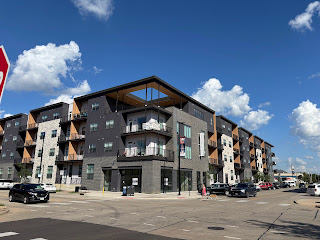- The focus of the discussion was not on housing for, say, teachers and firefighters, as it might have been in New York or San Francisco. Most of the panelists' concerns dealt with those employed at the low end of the pay scale, people with criminal records, and people with disabilities. Lisa Gavin, staff attorney for Iowa Legal Aid, noted their clients typically pay more than 50 percent of their income for housing--the official standard of "affordable" is below 30--which makes them one crisis away from homelessness. For a typical Supplemental Security Income (SSI) recipient, for example, receiving $735 a month, even $300/month rent is not affordable. Dale Todd, who moderated the discussion, cited the well-known situation created by de-institutionalizing mentally ill people without a plan for housing them.
- All panelists looked to the federal government for funding. Jennifer Pratt, Cedar Rapids' director of community development, noted that while there are options for housing "at all price points," the problems of low-income people aren't solvable by the private market. Section 8 vouchers work for those who can get them, meaning voucher holders can and do rent apartments, but largely because of limited program resources 80 percent of those who are eligible for Section 8 vouchers don't get them (Phoebe Trepp). The program is, however, "on the chopping block" in President Trump's FY18 budget (Jennifer Pratt). Cedar Rapids has no budget for homelessness, and Linn County provides $30,000 annually, so Willis Dady relies on federal funding and applies for state grants (Phoebe Trepp). Cedar Valley Habitat for Humanity provides 6-10 new homes per year, as well as help with repairs, but is looking for ways to help families who aren't homeownership-ready by "creatively leveraging dollars that are out there" (Jeff Capps). In addition to funding, current federal regulation from the Obama administration requires landlords not to excluce all those with criminal records, but to take into account factors like the time and nature of the crime (Dale Todd); that regulation is, of course, subject to change in the Trump administration.
- There appeared to be an opening, indeed an eagerness, for dialogue between housing advocates and landlords. While many landlords do not currently accept Section 8 vouchers, those present seemed amenable to doing so if their complaints were addressed like extra leases and inspections (Laura O'Leary). O'Leary noted there is no program available to help landlords make necessary repairs; another landlord, Gary Grimm, such an approach could be used as incentive for landlords to accept Section 8. Lisa Gavin of Iowa Legal Aid, noting that tenants encounter issues of rodents, plumbing, mold and HVAC but often don't act because "I have nowhere else to go," looked forward to collaboration with landlords and community buy-in, with the goals of achieving improved supply with profitability. Jeff Capps, executive director of Cedar Valley Habitat for Humanity, also hoped to work with landlords and developers on "bold steps" to respond to the shortage.
One thing they didn't discuss much on the panel is location. There are the core neighborhoods with older housing stock, a lot of which, Dale Todd noted, is deteriorating. But they are also located close to rapidly-developing areas like downtown and New Bohemia (as well as the future MedQuarter) which could if done right provide access to employment. That is less true for people who have moved or been pushed out to Blairs Ferry Road, Johnson Avenue or Pioneer Avenue. The low-income housing complex on Edgewood Road was well-intentioned, but that area is only connected to productive places by car, the ownership of which is either unaffordable or a huge burden to the marginally-employed.
Lastly, Phoebe Trepp of Willis Dady Homeless Shelter noted that "the will is here" to move forward on this issue, but those at the panel are fully occupied with their own tasks. "We need a leader to take this on," she said. How does such a leader emerge?
SEE ALSO: "The Housing Conundrum," 6 June 2017, for a national perspective with source list
Connor Morgan, "Cedar Rapids City Leaders Consider Options to Make Housing More Affordable," CBS2Iowa.com, 15 July 2017








No comments:
Post a Comment